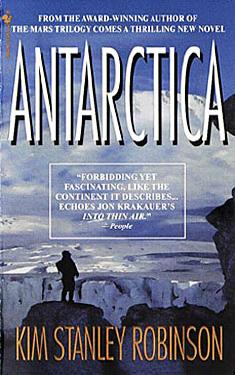
Added By: Administrator
Last Updated: Administrator
Antarctica
| Author: | Kim Stanley Robinson |
| Publisher: |
HarperCollins/Voyager, 1998 |
| Series: | |
|
This book does not appear to be part of a series. If this is incorrect, and you know the name of the series to which it belongs, please let us know. |
|
| Book Type: | Novel |
| Genre: | Science-Fiction |
| Sub-Genre Tags: | Colonization Human Development Near-Future |
| Awards: | |
| Lists: | |
| Links: |
|
| Avg Member Rating: |
|
|
|
|
Synopsis
A stark and inhospitable place, its landscape poses a challenge to survival; yet its strange, silent beauty has long fascinated scientists and adventurers. Now Antarctica faces an uncertain future. The international treaty that protects the continent is about to dissolve, clearing the way for Antarctica's resources and eerie beauty to be plundered. As politicians and corporations move to determine its fate from half a world away, radical environmentalists carry out a covert campaign of sabotage to reclaim the land. The winner of this critical battle will determine the future for this last great wilderness....
Excerpt
Chapter One
Hello my friends. Thank you for joining me on this voyage across the bottom of the Earth. As you can see, I have nearly completed the flight south from New Zealand. Soon we will arrive on the frozen continent. As we approach our landing, we see that deep in the big notch in the continent called the Ross Sea, a magnificent volcano has risen from the sea floor. This volcano makes a triangular island seventy kilometers across, and it rises around four or five thousand meters from the sea floor. Every measurement of this volcano's height comes up with a different figure, a fact that confirms what the eye sees immediately, that the inner line of Erebus's form creates a knot of lung-mai or dragon arteries that is precisely contiguous with its outward form, so that we see it in all five dimensions at once. This sometimes makes ordinary calculations of its height difficult.
Now we have landed, my friends, and are being driven across the sea ice to McMurdo. The little town, as you see, is placed in a scooped-out hollow on the tip of a long peninsula of the volcano island, an arm of lava that surged down off Erebus to the west not so very long ago, leaving a final lava cone at the very tip. How strong the dragon arteries of this island!
As we approach the tip of the peninsula and our landfall, let me recall for you the story of the first human landfall on Antarctica, which happened on January 24th of 1895. When Borchgrevink's expedition approached the Antarctic Peninsula, they were aware that all previous landings had been on islands offshore, and that no one had ever stepped on the actual land of the continent before. Borchgrevink and his ship's captain were rowed toward the rocky beach by a sailor, and as they approached they saw their chance at history. Borchgrevink began to move to the bow of the boat to climb out, and the ship's captain began to wrestle with him, claiming for some reason that he had the right to go first. The two men were wrestling still as the boat coasted up to the rocky beach, and seeing it the seaman rowing them leaped over the side into waist-deep water, and ran up to the shore ahead of the entangled officers. Thus he was the first human ever to step on Antarctica. What was his name? I can't remember.
On the slope of the town, now, we look back toward the airport on ice, and beyond it, across some fifty kilometers of the Ross Sea, to the mainland of the continent. It is a superb prospect. Over there mountains jump immediately out of the ocean: peaks taller than Fuji and Mont Blanc stand within twelve kilometers of the ocean, and the whole range, as you can see, is complex, multifaceted, and deeply riven by glacial valleys, down which slanting beams of yellow sunlight glow. On certain days optical effects in the air create fata morganas in which the mountains appear five times as tall as they do now. Oh my, yes. This view from McMurdo is very strong, bringing into play simultaneously all the landscape's oppositions: hsu-shih or empty-full, yin-hsien or invisible-visible, chin-yuan or near-far, also finite-infinite. Thus naturally the fifth dimension, li, the emptiness before all spacetime, is strongly evoked as well; and also that value of a landscape that goes beyond all notions of beauty, its i-ching or density of soul, and its shen-yun or divine resonance.
Here in the town itself, the views are all kao-yuan, looking up; before anything else, therefore, I am going to walk up to the top of Observation Hill, the volcanic cone at the end of the peninsula, overlooking the town as you see.
Copyright © 1997 by Kim Stanley Robinson
Reviews
Images
No alternate cover images currently exist for this novel.



















 Full Details
Full Details





